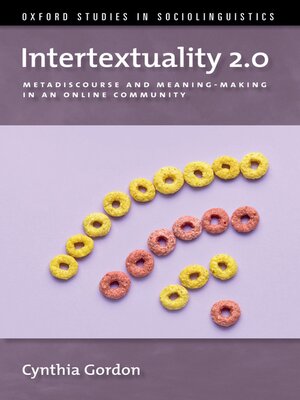Intertextuality 2.0
ebook ∣ Metadiscourse and Meaning-Making in an Online Community · Oxford Studies in Sociolinguistics
By Cynthia Gordon

Sign up to save your library
With an OverDrive account, you can save your favorite libraries for at-a-glance information about availability. Find out more about OverDrive accounts.
Find this title in Libby, the library reading app by OverDrive.



Search for a digital library with this title
Title found at these libraries:
| Library Name | Distance |
|---|---|
| Loading... |
"Intertextuality" is the overarching idea that all texts and conversations are linked to other texts and conversations, and that people create and infer meanings in discourse through making and interpreting these links. Intertextuality is fundamentally connected to metadiscourse; when a person draws on or references one text or conversation in another (intertextuality), they necessarily communicate something about that text or conversation (metadiscourse). While scholars have long recognized the interrelatedness of these two theoretical concepts, existing studies have tended to focus on one or the other, leaving underexplored the specific ways in which these phenomena are intertwined at the micro-interactional level, especially online, and for what purposes. This interactional sociolinguistic study contributes to filling this gap by demonstrating how specific intertextual linking strategies, both linguistic (e.g., word repetition, deictic pronouns) and multimodal (e.g., emojis, symbols, and GIFs), are mobilized by posters participating in online weight loss discussion boards. These strategies serve as a resource to accomplish the metadiscursive activities, targeted at various levels of discourse, through which participants construct shared understandings, negotiate the group's interactional norms, and facilitate engagement in the group's primary shared activity: exchanging information about, and providing support for, weight loss, healthful eating, and related issues. By rigorously applying the perspective of metadiscourse in a study of intertextuality, Intertextuality 2.0 offers important new insights into why intertextuality occurs and what it accomplishes: it helps people manage the challenges of communication.







